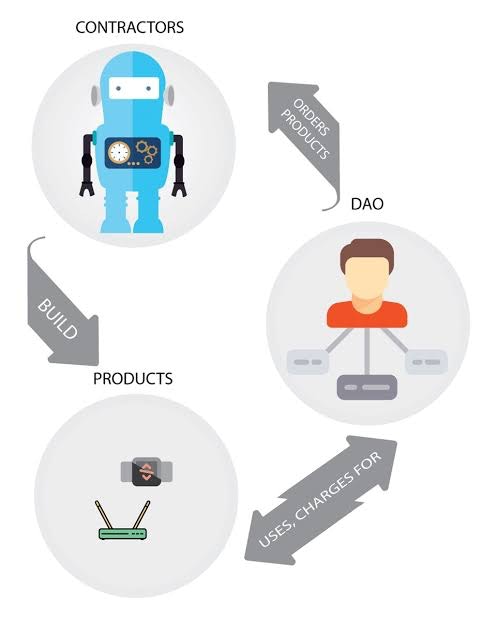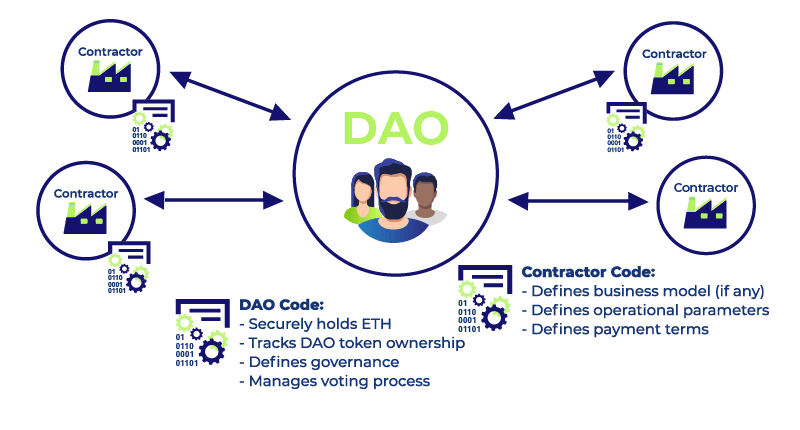What is a DAO?
06/05/2022
Imagine a world where you didn’t need a middleman to broker deals and agreements between people. A world where contracts were written in code and enforced by powerful algorithms. Well, that’s the world of decentralized autonomous organizations, or DAOs for short.
This article will explore what DAOs are, how they work, and some of the potential applications for this revolutionary new technology. Stay tuned!

A DAO, or Decentralized Autonomous Organization, is a type of organization that is run through code rather than by a traditional hierarchy.
This means that it can be run by anyone who has access to the code, and there is no central authority controlling the organization.
DAOs are often thought of as organizations that are controlled by smart contracts, or code that is stored on a blockchain. However, they can also be run off-chain, without using a blockchain.
DAOs have many potential applications, including being used as decentralized companies, governance systems, or even communities. They offer a way to decentralize power and give users more control over how an organization is run.
One notable example of a DAO is The DAO, which was the first large-scale, fully decentralized autonomous organization. It raised over $150 million worth of cryptocurrency through a crowdsale and successfully operated for nearly a year. Unfortunately, it was eventually hacked, and millions of dollars’ worth of cryptocurrency was stolen.
Despite this setback, many people are still interested in using DAOs to decentralize power and create more democratic organizations. Many different approaches are being taken to do this, including using smart contracts on blockchains like Ethereum and building centralized organizations that use smart contracts to help users participate in governance.
Thanks to their flexibility, decentralization, and ability to give users more control over how an organization or community is run, DAOs have the potential to change the way that we organize ourselves.
How do DAOs work?

DAOs are designed to be autonomous organizations run by code rather than by a central authority. This means that they can be controlled and governed by anyone who has access to the code. They can take many different forms depending on the specific use case.
One key aspect of DAOs is their ability to facilitate decentralized governance. This can be done using smart contracts on a blockchain or through other mechanisms that allow users to participate in decision-making and governance processes.
There are many potential applications for DAOs, including using them as decentralized companies, communities, or even governance systems.
Despite some high-profile setbacks, such as the hack of The DAO in 2016, many people are still interested in using DAOs to create more democratic and decentralized organizations.
There are a number of approaches being explored for how this can be achieved, including using smart contracts on blockchains like Ethereum and building centralized organizations that use smart contracts to help users participate in governance.
DAOs have the potential to change the way that we organize ourselves, thanks to their flexibility, decentralization, and ability to give users more control over how an organization or community is run.
Examples of DAO crypto platforms
1. Melonport: Melon is a decentralized asset management protocol on the Ethereum blockchain that enables users to set up, manage and invest in digital asset management strategies in an open, competitive and decentralized manner.
2. Giveth: Giveth is an open-source, decentralized platform for giving and receiving crypto donations. It allows donors to track how their donations are used and ensures that funds are used as intended by the recipient organization.
3. DAOstack: DAOstack is an operating system for DAOs that makes it easy for anyone to launch and manage a decentralized organization on the Ethereum blockchain. The platform provides a suite of tools for governance, collaboration, and decision making.
4. XYO Network: XYO Network aims to create a trustless ecosystem of devices where physical objects can be tracked in real-time using blockchain technology. The company intends for its platform to allow people to interact by sending or receiving ‘geo-located’ data.
Applying DAOs to the real world
The application of DAOs to the real world is a difficult undertaking, especially as they challenge the way the internet has been managed for the last couple of decades. One thing that helps is showing examples of how DAOs operate in the real world.
DAO projects provide an excellent model for how decentralized organizations can function and solve problems in the real world.
For example, we can look at initiatives like Bitnation, which uses blockchain technology to provide virtual passports and contracts without relying on centralized authorities. By using smart contracts, they are able to cut costs while still providing a secure service. This is just one example of how DAOs can be used effectively in the real world.
Another important factor when it comes to applying DAOs to the real world is identifying the problems that they can solve. For example, many DAOs focus on using decentralized technology to address issues like corruption and a lack of transparency. This makes them ideal for use in countries where bureaucracy is a problem.
Despite the potential benefits of DAOs in the real world, many people are resistant to change and may take some time to come around to this new way of doing things. To help overcome this challenge, it’s important to communicate the various benefits that DAOs offer through education and awareness campaigns. By showing how these technologies can be used to improve our lives, we can help more people embrace the idea of decentralization.
Overall, there are many practical applications for decentralized organizations in our everyday lives. By getting creative and thinking outside of the box, we can find new and innovative ways to improve our communities and make a lasting impact.
Wrapup
DAOs are an interesting development in the blockchain space. They offer a potential way to democratize governance of the online applications that are such a crucial part of the modern world. For those who dream of a decentralized and independent internet, DAOs are a step in the right direction.
Chat with the expert NFT promoters and marketers at Mooning
Sure, all the examples of NFT promotions we listed are from global brands with endless coin to throw at their campaigns. But you really don’t need a crazy-high budget to see some seriously incredible outcomes – as long as you know the delicate intricacies of building a killer NFT marketing strategy!
If not, no worries – Mooning is here to take care of everything for you and make sure you see the most amazing ROI you’ve ever seen before. Our team has the knowledge and experience to promote your NFTs in order to deliver maximum awareness and interest, driving the sales prices up sky-high and beyond.
We provide a full suite of expert NFT marketing services and go above and beyond for every one of our clients to ensure only the best results. Our team will help with everything from minting, listing and selling, NFT creator sourcing, community management and campaign conceptualisation.
So get in touch with us now on 1300 818 435 or message us online.





